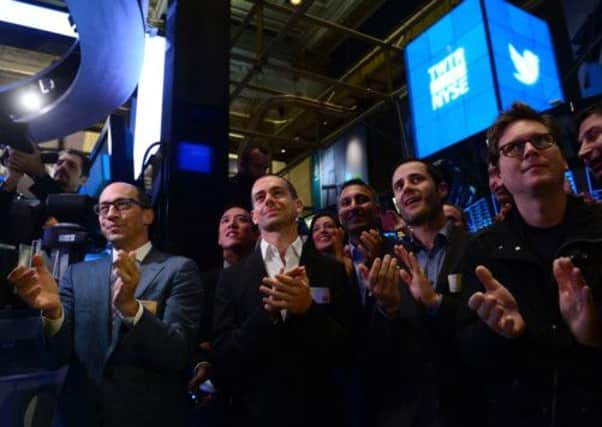Twitter IPO sees share price almost double in day


At the closing bell, Twitter was valued at 31 billion dollars (£19bn) - nearly as much as Yahoo, an internet icon from another era, and just below Kraft Foods, the grocery conglomerate founded more than a century ago.
The microblogging site, which allows its 230 million users to publish messages online using no more than 140 characters, was launched on the New York Stock Exchange (NYSE) by handpicked tweeters including actor Sir Patrick Stewart.
Advertisement
Hide AdAdvertisement
Hide AdSet up in 2006 and yet to turn a profit, the company had been valued at more than $18 billion (£11bn) by the bankers arranging its initial public offering.
But that figure was left looking cautious as feverish demand pushed Twitter’s share price from $26 to $45 as soon as it started to trade.
Investors were reportedly asking for 30 times the number of shares on offer as they bet on potential growth at the money-losing social media company.
The stock later passed the $50 mark, valuing Twitter at more than $30bn before easing back.
Twitter executives including chief executive Dick Costolo and founder Jack Dorsey were on the trading floor to witness the event. Mr Dorsey, whose stake is worth more than $1bn, tweeted congratulation to staff.
The company also opened its offices in San Francisco early, at 5:30am, as employees thronged to their 9th-floor cafeteria to watch Sir Patrick ring the opening bell at the stock exchange on television.
The Star Trek actor was joined by nine-year-old Vivienne Harr, who started a charity to end childhood slavery using the microblogging site.
“I guess I represent the poster boy for Twitter,” Sir Patrick said, adding that he had only been tweeting for about a year and was not buying Twitter stock. Twitter itself raised about $2bn from the flotation, which it is expected to reinvest to boost revenue and turn a profit.
Advertisement
Hide AdAdvertisement
Hide AdIts stock exchange debut was significantly smoother than that of rival Facebook, which saw its first day of trading last year marred by technical glitches. These are thought to have influenced Twitter’s choice of the NYSE for its listing.
While Twitter’s stock soared on the first day, Facebook spent its first year as a public company trading below its initial price.
Twitter’s valuation is still less than a third of Facebook’s worth, and the latter has been profitable for several years.
Twitter’s user base is also smaller than Facebook’s, which has more than 1 billion accounts worldwide. However, Twitter is considered more influential, with heads of state and celebrities among regular tweeters.
The ability to get themes “trending” have made it popular with those seeking to make a point, from campaigners targeting big companies such as Tesco to protesters taking part in the Arab Spring revolutions.
However, there are already signs some celebrities who helped Twitter take off are quitting the service.
The long list includes actors Alec Baldwin and Megan Fox as well as pop stars John Mayer and Miley Cyrus, with many citing fatigue at the relentless pace of messaging to and from fans.
Market analysts find it hard to estimate a true value of a firm like Twitter, as it is difficult to predict growth and what revenue streams it can tap.
Advertisement
Hide AdAdvertisement
Hide AdAnalyst Ken Doctor, at research firm Outsell, puts Twitter’s fundamental value at about half the initial public offering price set by its bankers. But he says that is not unusual, especially for tech companies. “You are betting on a big future.”
The internet’s ability to quickly produce hugely profitable firms such as Google means there is no shortage of people willing to take a flutter on Twitter.